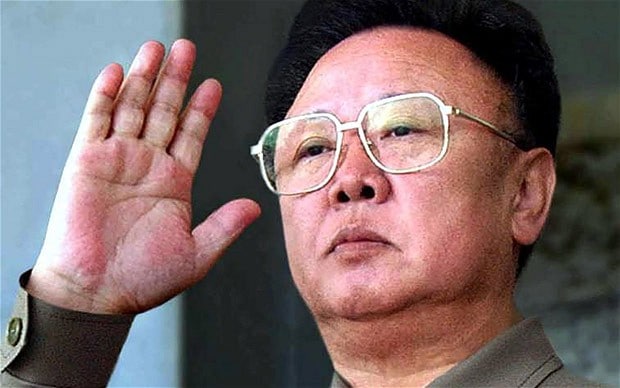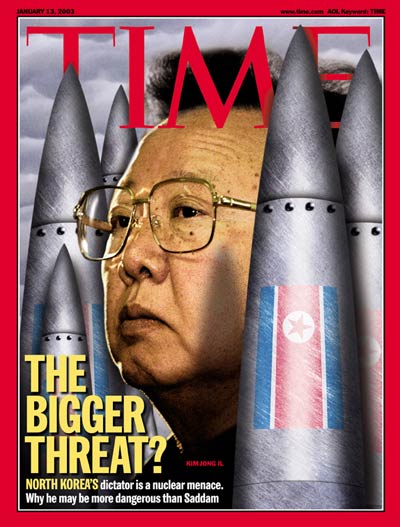The Personality Profile of North Korea’s Kim Jong-Il
The Personality Profile
of North Korea’s Kim Jong Il
김정일
Aubrey Immelman
Unit for the Study of Personality in Politics
December 2003

The Life of Kim Jong Il
A pictorial look at the North Korean leader through the years
A remote psychological assessment of North Korean leader Kim Jong-Il was conducted mining open-source data in the public domain. Information concerning Kim was collected from media reports and synthesized into a personality profile using the second edition of the Millon Inventory of Diagnostic Criteria (MIDC), which yields 34 normal and maladaptive personality classifications congruent with Axis II of DSM-IV.
The personality profile yielded by the MIDC was analyzed on the basis of interpretive guidelines provided in the MIDC and Millon Index of Personality Styles manuals. Kim’s primary personality patterns were found to be Ambitious/self-serving (narcissistic) and Outgoing/gregarious (histrionic), with a secondary Dauntless/dissenting (antisocial) pattern. In addition, the personality profile contained subsidiary but relatively unremarkable Dominant/asserting (sadistic), Contentious/resolute (passive-aggressive), and Erratic/unstable (borderline) features.
The amalgam of Ambitious (narcissistic) and Outgoing (histrionic) patterns in Kim’s profile suggests the presence of a syndrome that Theodore Millon has labeled the “amorous narcissist” (relabeled hedonistic narcissist in the context of political leadership studies). These personalities have an indifferent conscience and aloofness to the truth, are facile in the ways of social seduction, feign an air of dignity and confidence, and are skilled in the art of deception.
Characteristically, these personalities fabricate stories to enhance their worth and leave behind a trail of broken promises and outrageous acts, including swindling, sexual indiscretions, pathological lying, and fraud. However, the hedonistic narcissist’s disregard for truth and talents for exploitation and deception are rarely hostile or malicious in intent; fundamentally, they are not malevolent. Having never learned to restrain their fantasies, and unconcerned with matters of social integrity, hedonistic narcissists maintain their beguiling ways through deception, fraud, lying, and by charming others through craft and wit. Instead of applying their talents toward the goals of tangible achievements and genuine relationships, they selfishly devote their energies to the construction of intricate lies, cleverly exploiting others and slyly extracting from them what they believe is their due.
In summary, Kim Jong-Il may be characterized as fraudulent, self-indulgent, and conflict averse — preferring guile, craft, and cunning rather than force or confrontation in extracting or extorting from others what he considers his due; he is not a “malignant narcissist.”
The major political implications of the study are the following: First, although North Korea’s military capability undeniably poses a legitimate threat to regional stability, any claim by Kim Jong-Il with regard to his military capabilities are not to be taken at face value, but should be called into question and verified; second, Kim is relatively conflict averse and unlikely to employ military force without provocation; and third, Kim is relatively open to influence by carefully crafted diplomatic and economic means subjectively perceived as bolstering his self-serving ambitions.
Notable development: North Korea ready to deal?
May 2009 update
My 2003 threat assessment should be read in the context of August 2008 reports that Kim Jong-Il had suffered a stroke.
Although I did not find Kim to be paranoid or delusional in my 2003 assessment, it is possible for stroke patients to undergo personality changes, including an increase in suspiciousness, or to develop psychiatric syndromes such as post-stroke depression or post-stroke dementia, which may impair the patient’s mental state and cognitive functioning.
Should that be the case with Kim Jong-Il, it may exacerbate a prior siege mentality, resulting in increasingly self-defeating, erratic behaviors patterns.
Despite remaining convinced that Kim is fundamentally risk-averse, I do have a heightened concern that a possible recent-onset organic brain syndrome could impair his insight, judgment, and decision-making capacity.
In the event Kim’s medical condition should color his pre-existing, premorbid personality with paranoid ideation or delusional thinking, he is likely to become increasingly mistrustful and vigilant; irritable and thin-skinned (hypersensitive to perceived slights and easily enraged by narcissistic injury); defiant, hostile, belligerent, and vengeful (determined to “balance the books” with respect to what he perceives as past wrongs); dichotomous ( “us versus them” social perception); insular (impervious to corrective action in response to sound advice and new information); self-righteous (arrogant and acting with a sense of entitlement); and self-justifying (viewing his own transgressions either as defensive necessity or as “payback” for the malevolence or wrongs of others).
Finally, no threat assessment would be complete without verifying who is currently “calling the shots” in North Korea, so to speak. Considering Kim’s recent medical history, it could be risky to respond to North Korean provocation under the assumption that Kim Jong-Il is fully in charge.
July 2012 update
Containing North Korea: The Psychological Profile of Kim Jong Il. Paper presented by Aubrey Immelman at the 35th Annual Scientific Meeting of the International Society of Political Psychology, Chicago, July 6–9, 2012. Abstract at Digital Commons: http://digitalcommons.csbsju.edu/psychology_pubs/105/
Containing North Korea:
The Psychological Profile
of Kim Jong Il
김정일

Vladimir Sayapin / Time
Aubrey Immelman
Unit for the Study of Personality in Politics
July 2012
This report presents the results of a remote psychological assessment, conducted 2003–2004, of the personality of Kim Jong-Il, North Korea’s leader at the time of the study, from the conceptual perspective of personologist Theodore Millon.
Psychodiagnostically relevant data regarding Kim was extracted from open-source intelligence and synthesized into a personality profile using the Millon Inventory of Diagnostic Criteria (MIDC), which yields 34 normal and maladaptive personality classifications congruent with Axis II of DSM–IV.
The personality profile yielded by the MIDC was analyzed in accordance with interpretive guidelines provided in the MIDC and Millon Index of Personality Styles manuals. Kim’s primary personality patterns were found to be Ambitious/self-serving (narcissistic) and Outgoing/gregarious (histrionic), with a secondary Dauntless/dissenting (antisocial) pattern. In addition, the profile contained subsidiary but relatively unremarkable Dominant/asserting (sadistic), Contentious/resolute (passive‑aggressive, or negativistic), and Erratic/unstable (borderline) features.
The amalgam of Ambitious (narcissistic) and Outgoing (histrionic) patterns in Kim’s profile suggested the presence of a syndrome that Millon has labeled the “amorous narcissist” (relabeled hedonistic narcissist in the present context of political leadership studies).
This political personality type is narcissistic and histrionic, with antisocial tendencies, but not substantially paranoid or sadistic. Although not as dangerous in terms of threat assessment as the so-called “malignant narcissist,” the hedonistic subtype offers its own distinctive set of challenges in the international arena.
Hedonistically narcissistic leaders are most notable for their indifferent conscience, their fraudulence, and their skill in the art of deception. Unlike malignant narcissists, they are conflict averse, preferring guile, craft, and cunning rather than force or confrontation in extracting or extorting from others what they consider their due.
The major policy implications of the study with reference to psychological operations to contain North Korean military adventurism and aggression were the following: First, it suggested that no claim, concession, or threat by Kim Jong Il could be taken at face value; he was the consummate con artist. Second, compared with malignantly narcissistic personality types such as Saddam Hussein, Kim was relatively conflict averse and unlikely to employ military force without provocation. Third, the profile suggested that Kim, like the more benignly narcissistic Muammar al-Qaddafi, was relatively open to influence by carefully crafted diplomatic means subjectively perceived as serving his self-interest and regime survival.










Follow Aubrey Immelman